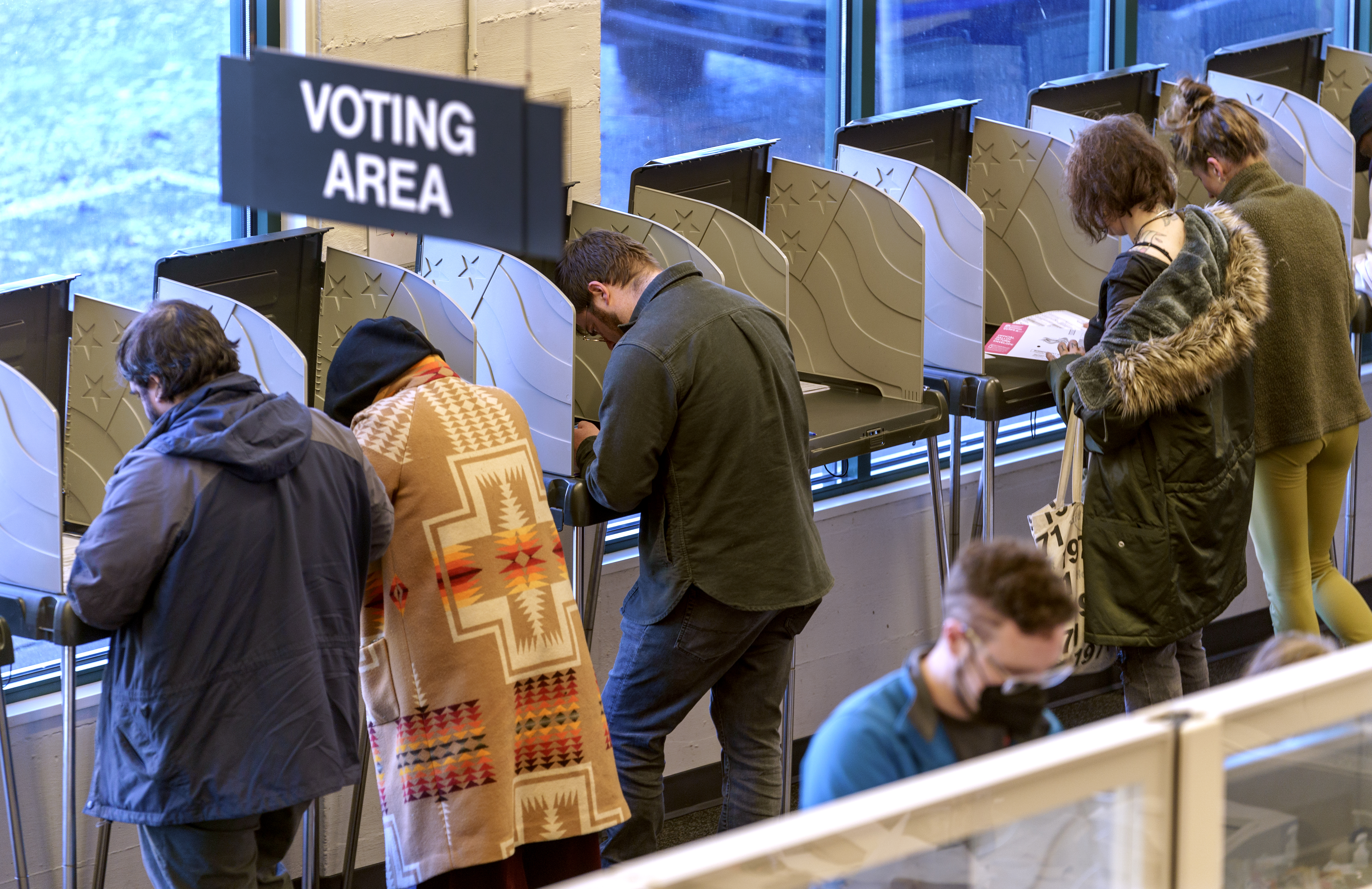
FILE: Voters at the Multnomah County Elections Division in Portland, Ore., Nov. 8, 2022. A bill before the Oregon Senate would expand the state's automatic voter registration system.
Kristyna Wentz-Graff / OPB
Secretary of State Shemia Fagan might be on her way out of office, but one of her top legislative priorities isn’t going anywhere.
On Wednesday, the Oregon House passed Fagan’s proposal to automatically register unregistered voters who sign up for the Oregon Health Plan, the state’s subsidized health care for low-income Oregonians. The 34-25 party-line approval of House Bill 2107 came despite protests from Republicans who are suspicious of the proposal and argued it is tainted by its connection to Fagan.
“Because of the cloud of scrutiny under which Secretary of State Fagan resigned, I have little confidence in this bill that solely bears her name,” state Rep. E. Werner Reschke, R-Malin, said on the House floor.
Democrats, who have long made increasing voter registrations and easing voting restrictions a key goal, said Fagan’s involvement had no bearing on the substance of the bill.
“The policy in the bill is sound and has been vetted for over two years,” House Majority Leader Julie Fahey, D-Eugene, said Tuesday.
HB 2107 would expand on one of Oregon’s pioneering elections policies.
In 2016, the state became the first in the nation to enact a “motor voter” law that registered citizens to vote when they interacted with the Driver and Motor Vehicle Services department to get an ID. Rather than an “opt-in” policy where Oregonians had to affirmatively choose to be registered, the state went with an “opt-out” program, registering voters unless they expressly say they do not want to receive a ballot.
The idea has been credited with increasing voter participation in Oregon. The state had the highest percentage of eligible voter turnout in the country in last year’s election, with 61.5%.
Motor voter has since been adopted by 22 states and Washington, D.C., according to the National Conference of State Legislatures. But lately, Oregon has fallen out of the vanguard when it comes to voter registration.
“I was at a conference last year and there was a presentation on automatic voter registration,” Fahey said in an interview last month. “For the first time ever, Oregon was not listed as the people leading the way on this. The people from Nevada got, like, a standing ovation.”
HB 2107 would put Oregon in league with Nevada and Colorado in expanding opt-out registration to the state’s Medicaid program, the Oregon Health Plan. Other states have adopted variations on that policy, according to the Secretary of State’s Office.
But converting Oregon Health Plan enrollees into new voters isn’t automatic. Colorado has been waiting years for the green light from federal officials, which must authorize sharing health data for that purpose.
Under HB 2107, automatic registrations via the Oregon Health Authority could not begin until 2026.
There are approximately 200,000 Oregonians who are eligible to vote but not registered, according to estimates from the Oregon Secretary of State. Fagan said earlier this year about 85% percent of those people — 171,000 — are on the Oregon Health Plan.
“If they had interacted with the DMV since Oregon motor voter went into effect — either getting a driver’s license or just an identification card — then they would already be registered,” she said in a March interview. “We don’t know the reason why they’re unregistered.”
Republicans were plainly suspicious about the makeup of those 171,000 unregistered voters. In committee, GOP representatives requested a breakdown of where those people lived in the state, but were told the Oregon Health Authority would not release that information.
In Colorado, Republican lawmakers voiced concerns that registering people through Medicaid could disproportionately favor Democrats.
Republicans have also questioned whether the bill would compromise the integrity of the state’s voting process.
Oregonians must have a signature on hand with a county elections office to vote, so the signature on their ballot envelope can be checked against the one on file. It’s a key security feature of the state’s all-mail election system.
Signatures are no problem when registering people via the DMV, because they’re supplied as part of obtaining an ID.
That’s not the case with the Oregon Health Plan. Under HB 2107, the state might find itself in the position of registering people who have no such signature on file. Fagan and Fahey said the Secretary of State’s Office will craft rules that ensure people without a valid signature on file are not allowed to vote. How the government would make that happen is not yet clear.
“There are a lot of unanswered questions about this bill,” state Rep. Anna Scharf, R-Amity, said in Wednesday’s vote. “It is not ready.”
Republicans also argued that it’s already very easy to register in Oregon, saying that anyone who wants to vote can do so without difficulty. “You can lead a horse to water but you can’t make them drink,” said state Rep. Emily McIntire, R-Eaglepoint. “I feel like we do everything in this state to make sure we have the utmost ability to make sure people have everything they need.”
Fahey, one of the only Democrats to speak on the bill Wednesday, said Republican concerns were unwarranted.
“Some today have suggested that the integrity of our election system is in question,” she said. “I want to unequivocally refute that assertion. … The reality is that our election system is safe and secure, including our automatic voter registration system.”
HB 2107 now moves to the Senate, where Republicans have begun a walkout in protest of Democrats’ agenda. It’s not the only piece of Fagan’s agenda making its way through the legislative process. A bill she introduced with the aim of increasing election security and discouraging harassment of elections workers passed the Senate with a bipartisan vote last month.



